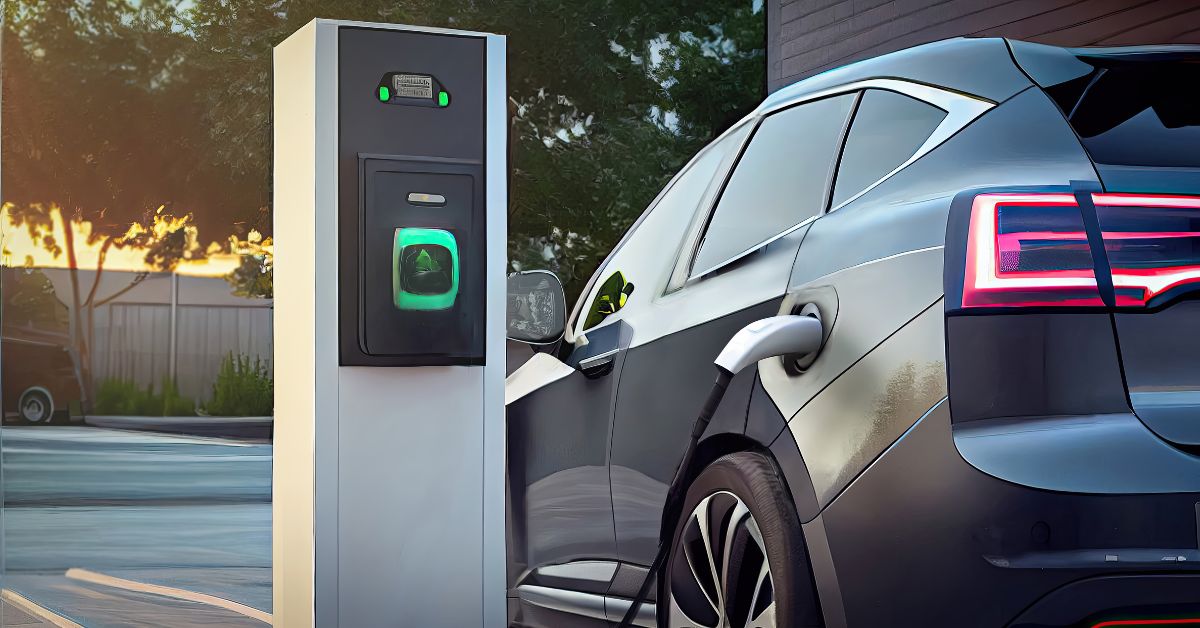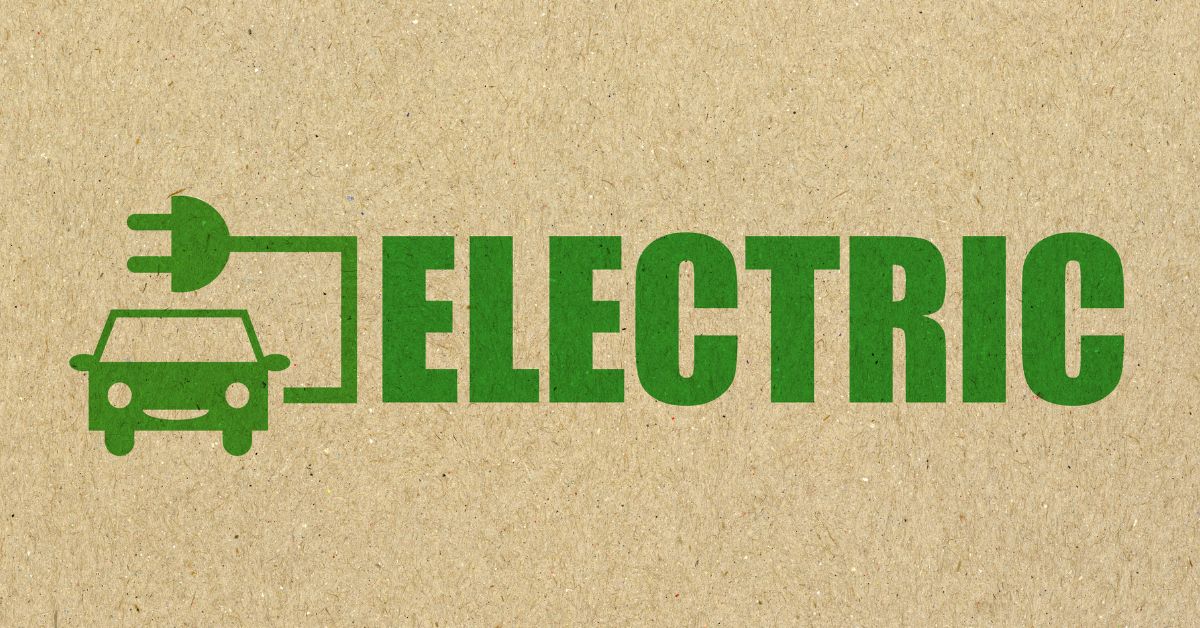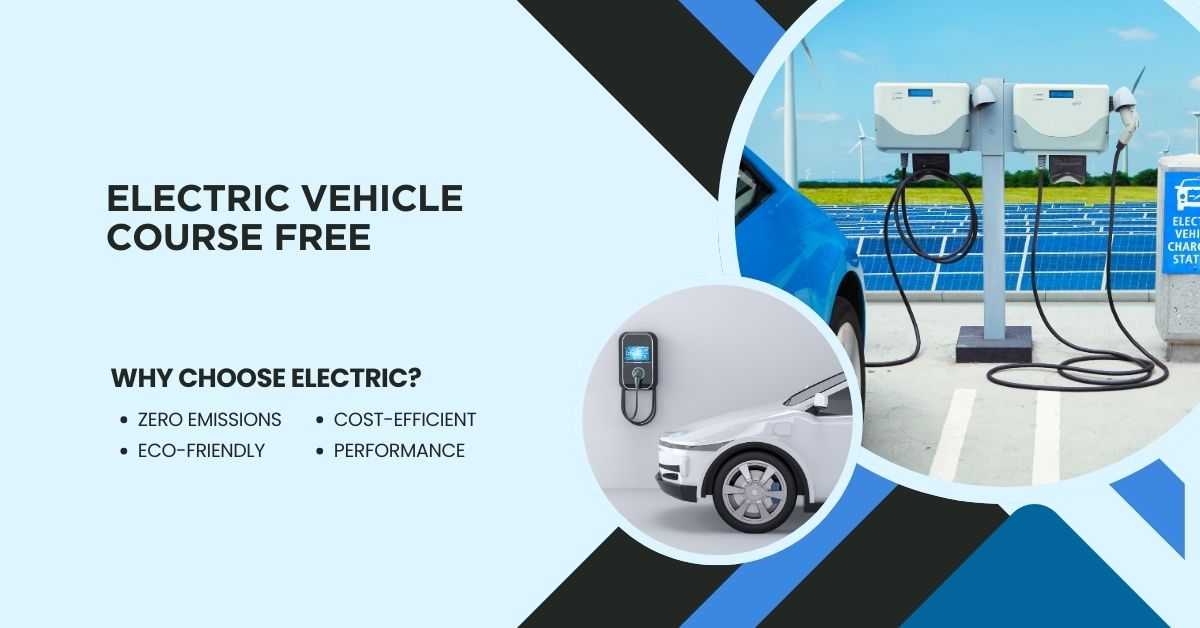Electric Vehicle Course Free
The “Electric Vehicle Course Free” offers a comprehensive introduction to the world of electric vehicles (EVs) without any cost. This course covers essential topics such as EV technology, battery systems, charging infrastructure, and the environmental benefits of transitioning to electric mobility.
Designed for beginners and enthusiasts alike, it provides a solid foundation in EV mechanics, market trends, and the latest innovations. Through video tutorials, interactive lessons, and practical examples, learners can gain valuable insights into the rapidly growing EV industry. Perfect for anyone looking to enhance their knowledge or pursue a career in the sustainable transportation sector.
Table of Contents
Electric Vehicle Course Free: Unlocking the Future of Green Transportation
Electric vehicles (EVs) represent the future of transportation, a shift away from internal combustion engines (ICE) and fossil fuel dependence. As the world embraces sustainable energy and eco-friendly technologies, electric vehicles have emerged as a key component in this global effort. To support the increasing demand for professionals in this burgeoning field, many institutions and platforms are offering electric vehicle courses for free. These courses cover various aspects of electric vehicles, including their design, operation, maintenance, and integration with renewable energy sources.
In this blog, we’ll explore the importance of electric vehicle education, provide an overview of the content typically covered in these free courses, and discuss some of the top platforms offering such learning opportunities. Whether you’re an aspiring engineer, a student, or simply an enthusiast of green technology, a free EV course could be your gateway to a future in sustainable transportation.
Why Electric Vehicles Matter
Before delving into the details of available EV courses, it’s essential to understand why electric vehicles are crucial in today’s world. The transportation sector is a significant contributor to global carbon emissions, primarily due to the reliance on fossil fuels like gasoline and diesel. Electric vehicles, on the other hand, operate using electricity stored in batteries, producing zero emissions at the point of use.

Here are some key reasons why electric vehicles are so important:
- Reduction in Carbon Emissions: EVs produce no tailpipe emissions, helping to reduce pollution and combat climate change.
- Energy Efficiency: Electric vehicles convert over 77% of the electrical energy from the grid to power at the wheels, compared to about 30% for gasoline-powered cars.
- Renewable Energy Integration: EVs can be charged using renewable energy sources like wind, solar, and hydropower, making them part of a broader green energy strategy.
- Lower Operating Costs: The cost per mile to drive an EV is generally lower than that of a traditional ICE vehicle, thanks to the lower price of electricity compared to gasoline and fewer maintenance requirements.
- Technological Advancements: The shift to electric vehicles is driving innovation in battery technology, autonomous driving, and smart energy grids.
Given these benefits, the demand for electric vehicles is increasing worldwide. As governments push for cleaner alternatives to conventional cars, many countries are offering incentives to promote the use of EVs. This shift has also led to a surge in job opportunities in areas such as EV design, manufacturing, battery production, and charging infrastructure.
The Growing Need for EV Education
As electric vehicles continue to grow in popularity, there is a rising demand for skilled professionals who can design, build, and maintain these advanced vehicles. Learning about EVs not only opens doors to exciting job opportunities but also helps individuals stay ahead of technological trends that are shaping the future of transportation.
The rapid evolution of EV technology requires an understanding of various technical disciplines, including electrical engineering, mechanical engineering, software development, and energy management. Many engineers and technicians are transitioning from traditional automotive roles to positions in the EV industry, and this shift often requires them to gain new skills and knowledge.
Fortunately, with the rise of online education platforms, learning about electric vehicles has become more accessible than ever. Several institutions and organizations now offer free electric vehicle courses that cover a range of topics, from basic EV principles to more advanced areas such as battery management systems, power electronics, and autonomous driving technology.
Key Topics Covered in Free Electric Vehicle Courses
Electric vehicle courses can range from beginner to advanced levels, catering to individuals with varying levels of expertise. Here’s a breakdown of the key topics typically covered in these free courses:
Introduction to Electric Vehicles
This foundational module introduces learners to the basic concepts of electric vehicles. Topics covered may include:
- The history and evolution of electric vehicles
- Differences between electric vehicles and internal combustion engine vehicles
- Types of electric vehicles (Battery Electric Vehicles, Hybrid Electric Vehicles, Plug-in Hybrid Electric Vehicles, and Fuel Cell Electric Vehicles)
- Environmental and economic benefits of EVs
- Overview of the electric vehicle market and industry trends
This module serves as a stepping stone for individuals with no prior knowledge of electric vehicles and sets the stage for more in-depth study.
EV Architecture and Design
In this section, students learn about the key components that make up an electric vehicle. Topics include:
- Electric motors: how they work and their role in EVs
- Battery technologies: lithium-ion batteries, solid-state batteries, and their applications in EVs
- Powertrain design: how energy is transferred from the battery to the wheels
- Charging systems: types of EV chargers (Level 1, Level 2, DC fast charging) and charging infrastructure
- EV control systems: the software and hardware that manage vehicle performance, energy consumption, and safety
The EV architecture module is crucial for students who wish to understand how electric vehicles are designed and assembled.
Battery Management Systems (BMS)
The battery is the heart of an electric vehicle, and its efficient management is vital for ensuring long battery life, safety, and performance. In this section, learners explore:

- Battery chemistry and materials used in EV batteries
- Principles of battery management systems (BMS)
- Battery charging and discharging processes
- Thermal management of batteries
- Battery safety and failure modes
- The future of battery technology, including research into solid-state and alternative chemistries
BMS knowledge is highly valued in the EV industry, especially as companies seek to improve battery efficiency and safety.
Power Electronics and Energy Conversion
Power electronics are essential for converting energy from the battery to a form usable by the motor and other vehicle systems. In this module, students learn:
- The role of power electronics in electric vehicles
- Inverters, converters, and motor controllers
- Energy storage and regenerative braking systems
- Efficiency and power loss minimization
- Vehicle-to-grid (V2G) technology and energy management systems
This module helps learners understand how electrical energy flows through an EV and how it is optimized for performance and efficiency.
Charging Infrastructure and Energy Management
One of the biggest challenges for widespread EV adoption is the availability of the charging infrastructure. This module covers:
- EV charging standards and protocols
- Types of charging stations (home, public, and fast charging)
- Smart charging and grid integration
- Charging station installation and maintenance
- Renewable energy integration with EV charging
- Future trends in wireless charging and ultra-fast charging
With the global push for expanding charging networks, professionals with knowledge in this area will be in high demand.
Autonomous and Connected Vehicles
Electric vehicles are often at the forefront of autonomous and connected vehicle technology. This section explores:
- Levels of vehicle autonomy, from driver assistance systems to fully autonomous vehicles
- Sensors and technologies used in autonomous EVs (LIDAR, RADAR, cameras, and GPS)
- Vehicle-to-vehicle (V2V) and vehicle-to-infrastructure (V2I) communication
- The role of artificial intelligence (AI) and machine learning in autonomous EVs
- Ethical and safety concerns with autonomous vehicles
- Current trends and future developments in self-driving EVs
As self-driving technology becomes more advanced, knowledge in this field will be crucial for those working on the cutting edge of transportation.
EV Policy and Market Trends
The success of electric vehicles is not just dependent on technology but also on government policies, incentives, and market dynamics. In this module, students explore:
- EV incentives and subsidies offered by different countries
- Global market trends and forecasts for electric vehicle adoption
- Government regulations and emissions standards
- The role of policy in promoting EV adoption
- Business models for electric vehicles, including ride-sharing and EV leasing
- The impact of EVs on traditional automotive industries and supply chains
Understanding the policy landscape is vital for professionals looking to work in EV business development, strategy, or policy advocacy.
Top Platforms Offering Free Electric Vehicle Courses
Now that we’ve covered what you can expect to learn in an electric vehicle course, let’s explore some of the top platforms that offer free EV courses online:

Coursera
Coursera is a leading online learning platform that partners with top universities and organizations to offer free courses across various fields. While many courses require payment for certification, you can often audit them for free. Several EV-related courses are available on Coursera, including:
- Electric Vehicles and Mobility by Delft University of Technology: This course provides an in-depth overview of electric vehicle technologies and the future of mobility.
- Introduction to Battery Management Systems by the University of Colorado Boulder: A technical course focused on the design and operation of BMS in EVs.
edX
edX is another popular platform offering courses from universities like MIT, Harvard, and UC Berkeley. Some free electric vehicle courses on edX include:
- Electric Vehicles – Introduction by Delft University of Technology: A beginner-friendly course that covers the basic principles of EVs.
- Energy Storage for Electric Mobility by TU Delft: A course that dives deep into energy storage solutions for electric vehicles.
FutureLearn
FutureLearn is an online education platform offering short courses in collaboration with global universities. Some notable free EV courses include:
- Electric Vehicles: Benefits, Issues, and Future by Open University: This course covers the environmental and social impact of electric vehicles.
- Battery Storage Technology by the European Institute of Innovation and Technology (EIT): Focused on battery technology and its role in electric mobility.
Alison
Alison offers free courses in a wide range of topics, including electric vehicle technology. Their Diploma in Electric Vehicle Technology is a popular choice, covering everything from EV basics to more advanced topics like battery technology and vehicle design.
OpenCourseWare (OCW)
Several universities, including MIT and Stanford, offer free educational materials through their OpenCourseWare platforms. While these are not structured courses, they provide lecture notes, assignments, and reading materials on EV-related topics such as power electronics, battery technology, and energy management systems.
FAQs About Electric Vehicle Course Free
Q1. What is an Electric Vehicle (EV) course?
An EV course teaches the fundamentals of electric vehicles, covering key concepts like electric motors, battery technology, charging infrastructure, and EV design principles. Many free courses are introductory and cater to beginners interested in learning about the electric vehicle industry.
Q2. Are free EV courses comprehensive?
Free EV courses usually provide a solid foundation but may not cover advanced or in-depth topics. They are a great way to gain basic knowledge, but paid courses often offer more detailed content, hands-on projects, and certifications.
Q3. Can I get a certification from a free EV course?
Some free EV courses offer certificates of completion, but it depends on the platform and course provider. Make sure to check the course details to see if certification is included at no cost or for a small fee.
Q4. What are the benefits of taking an EV course?
An EV course can help you understand the growing electric vehicle market, the technology behind EVs, and their environmental benefits. It can also boost your knowledge for career opportunities in the EV industry, whether in engineering, manufacturing, or sales.
Q5. Who can enroll in a free electric vehicle course?
Most free EV courses are open to anyone with an interest in electric vehicles. They are suitable for students, professionals, and enthusiasts who want to learn about this field, regardless of prior experience.
Q6. Do free EV courses include practical, hands-on learning?
Many free courses focus on theory, but some may include case studies, virtual labs, or simple projects to enhance practical understanding. For hands-on experience, you may need to look into more advanced, paid options.
Q7. What topics are typically covered in a free EV course?
Common topics include EV components, battery systems, electric motors, charging technologies, environmental impacts, and the future of electric mobility. Some courses might also touch on regulatory policies and market trends.
Q8. How long does it take to complete a free EV course?
The duration of free EV courses can vary. Some can be completed in a few hours, while others may take weeks, depending on the depth of content and your own pace of learning.
Q9. Where can I find free EV courses?
Free EV courses can be found on platforms like Coursera, edX, Udemy, and government or university websites. Many institutions offer these courses as part of open education initiatives.
Q10. Can a free EV course help me start a career in electric vehicles?
While a free course provides valuable foundational knowledge, building a career in the EV industry may require more advanced study, practical experience, or certification from accredited programs. A free course can be a great first step toward exploring this career path.
As the world shifts toward greener and more sustainable transportation options, electric vehicles will play a pivotal role in reducing emissions and improving energy efficiency. For anyone interested in a career in the EV industry, now is the time to learn and acquire the skills needed to succeed in this fast-growing sector.
With numerous free electric vehicle courses available online, you can gain knowledge and expertise without spending a fortune on tuition. From basic EV principles to advanced topics like battery management and autonomous driving technology, these courses offer a comprehensive education that can help you stay ahead of the curve.
Whether you’re an aspiring engineer, technician, policymaker, or business professional, taking advantage of these free educational resources will equip you with the tools to thrive in the electric vehicle industry and contribute to a more sustainable future.
Click here to learn more about the Electric Vehicle Course Free
